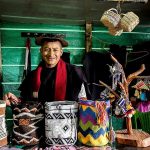Wilson Calambás, through his fabrics, gave life to the ‘Warehouse and clothing Misak Srailø, in Silvia, Cauca.
In the village of El Tejar, located half an hour from the municipal seat of Silvia, municipality of Cauca, a business idea was woven from the pride of belonging to the Misak indigenous people and the vision of a micro-entrepreneur, Wilson Calambás, to whom to leave His refuge in the capital of the country opened his mind to return to his community to undertake, highlighting the art and cosmogony of his ethnic group, with which he gave life to his ‘Warehouse and clothing Misak Srailø, Misak Fabrics’.
Micro, small and medium-sized enterprises (MSMEs) contribute to sustainable development and the global economy, and the purpose of Empropaz is to highlight the importance of creating opportunities for their growth and consolidation, especially in vulnerable areas, such as many regions of Colombia, in which the creation of a microenterprise represents the livelihood of a family and the development of an entire community.
This is the case of Wilson and his family, who manufacture and sell handicrafts, as well as garments typical of their community, made by them based on the knowledge inherited from their ancestors and that continues to be transmitted from generation to generation.
His business has been growing, largely due to contacts and alliances that Wilson has made, also due to participation in fairs, such as those of the Colombian Association of Travel and Tourism Agencies (Anato), sales through social networks and, recently, thanks to a friend from his community who lives in the United States, he made his first shipment to that country. Wilson is a beneficiary of the Productive Enterprises for Peace (Empropaz) program, an initiative led by Bancamía, an entity of the BBVA Microfinance Foundation, in partnership with USAID, which seeks to promote the strengthening of companies and the birth of new businesses, specifically in 92 municipalities of 17 departments, affected by violence and poverty, in which 194,000 people have been impacted with specialized training and financial inclusion processes under special conditions.
“In these almost 15 years we have been interested in understanding microentrepreneurs, knowing first-hand their social conditions, clearly identifying their limitations, and thus, from now on, how from our value offer we propose to solve them. Financial inclusion must start from a broad perspective, we must go beyond the financial, as we have done with Wilson, because only in this way can our support model have a better success rate that results in an improvement in their quality of life. ”, said Viviana Araque Mendoza, executive president of Bancamía.
From the accompaniment through Empropaz, Wilson says that he implemented an accounting book to control his income and expenses, developed marketing strategies to generate contacts and publicize his products in other municipalities of Cauca, through departmental fairs, but also in other cities such as Barranquilla, Armenia and Bogotá, to which it sends merchandise, especially backpacks, thanks to social networks.
In fact, communication with his clients in Colombia and other parts of the world has been possible with a computer that he bought through the strengthening credit that he accessed with Bancamía, which also invested in machines to carry out the clothing manufacturing processes. traditional in a more technical way within its Guambía Reservation, where 13,000 Misak live, with the aim of saving time, especially at times of the year when there are more orders.
He acquired raw material to fulfill orders and be able to offer more products, of which he feels proud, since, from them, people understand their cosmogony as an indigenous people from the designs, colors and techniques used. Seeing the value and interest this generates, Wilson identified a tourist service that he now offers, called the ‘Misak Weaving Route’. “Obtaining a loan strengthened us because we had many things to offer, but we needed the resources to continue growing. Sometimes we had a lot of orders, but we didn’t look good because we needed raw materials and a filleting machine to sew the Misak costume more quickly, which our elders made by hand and takes a lot of time. The trainings strengthened me a lot in the family, seeing that my wife is also a great support in the business. The accounting, administrative and marketing part have been very helpful to me, I even replicate it to other colleagues”.
